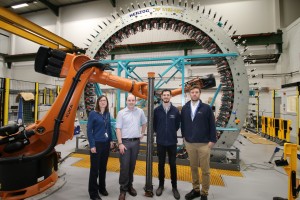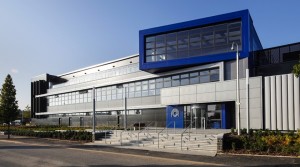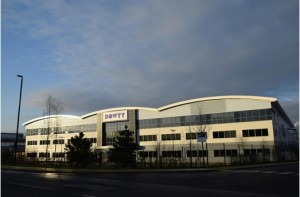A pioneering £20m project to develop lightweight propeller blades that will help the UK aviation sector cut its carbon footprint and reduce noise at airports is being supported by Bristol’s National Composites Centre (NCC).
The NCC, on the Bristol & Bath Science Park, is part of an industry-led consortium carrying out research into the use of lightweight composite material in aircraft propeller design – one of a number of projects looking to de-carbonise the aerospace sector and make flying less environmentally damaging. 
The consortium is tasked with growing the UK’s aerospace propeller manufacturing base by harnessing composite technology with industrial digitalisation to cut production costs and increase the performance of future propulsion systems in Europe’s €200bn (£167bn) aviation sector.
It is being carried led by composite researchers at the University of Sheffield Advanced Manufacturing Research Centre as part of the High Value Manufacturing Catapult, supported by the NCC and the Manufacturing Technology Centre in Coventry – which are also part of the Catapult – along with private sector partner Gloucester-based Dowty Propellers (part of GE Aviation Systems).
Funding is coming from Innovate UK, the UK’s organisation tasked with promoting innovation and the strategic use of technology in British industry.
The project is also key to achieving Europe’s Flightpath 2050 vision, which states that the European aviation community should “lead the world in sustainable aviation products and services, meeting the needs of EU citizens and society”.
AMRC Composite Centre automation technical lead Elaine Arnold said: “In a world of increasing passenger numbers the demand for cleaner, cheaper and yet more comfortable air travel has never been greater. To meet this demand, it is vital that the UK maintains and extends its world leading capability in sustainable UK aviation propulsion technologies.”
She said developing technologies to reduce propeller noise and lower fuel burn through the Digital Propulsion programme demonstrated a clear commitment to these goals. 
“The Digital Propulsion project aims to evolve technologies within a new digital infrastructure to realise innovations in propulsion performance and cost,” she said.
“Part of the role of AMRC is to explore novel and innovative ways to design and manufacture varying types of propeller blades, from regional to small, including the load-bearing structure, the cores, the blade roots and relevant hub connections.
“This is being carried out alongside the NCC, which will be exploring the use of their specific manufacturing and design technologies.
“The other side to it, and much more excitingly, is that both the AMRC and NCC are collaborating to form a new braid that fits these new shapes. Engineers have been coming up to Sheffield and us down to Bristol which means a cross pollination of ideas and for everyone to see that we are better working together.
“Our portfolio of cutting edge equipment means we’re able to access a wide range of advanced technologies to do this work including finite element analysis, braiding, tailored fibre placement, resin transfer moulding and press forming.”
The next steps will be to look at the braiding of multiple parts of the blade and then the thermoforming of the foam that sits on the inside of the blade.
“Excellent progress has been made so far and the goal is for us to make a section of the full blade,” said Elaine. 
“It is very much a collaborative piece of work and a great example of why collaboration across the High Value Manufacturing Catapult centres is of tremendous benefit to industry; engineers from the AMRC and NCC are exchanging their understanding and knowledge of capabilities to find and develop innovative manufacturing methods that will not only reduce costs but increase performance, positioning the UK as a world leader in this field.
“Dowty has flown the flag for the British aerospace industry across the world for many years, and this project will ensure it continues to do so into the future.”
The three-year programme has allowed Dowty to investigate multiple technologies to design the next generation of composite propeller blades, incorporating new and novel geometries beyond current capabilities offered by existing manufacturing techniques.
The University of Bristol-owned NCC, which boasts the best composites engineering capabilities in the world, works with leading manufacturers on research into future industrial materials.
Its backers read like a who’s-who of engineering excellence and include Bristol-based aerospace giants such as Airbus, Rolls-Royce and GKN – which are using the centre to develop new stronger and lighter materials for aircraft and engines – along with international groups such as 3M, Shell and Siemens.
Last month aerospace giant Rolls-Royce’s Bristol plant has started work on harnessing world-beating composite technology to develop a new generation of jet engines that could transform air travel by slashing emissions. Both Airbus and GKN in Bristol are working on developing lightweight composite materials for us in aircraft wings, including through a joint ‘wing of tomorrow’ programme.
Pictured: Top, the AMRC Composite Centre team working on the £20m Digital Propulsion project. Centre, the National Composite Centre. Bottom, Dowty Propeller’s Gloucester factory






























